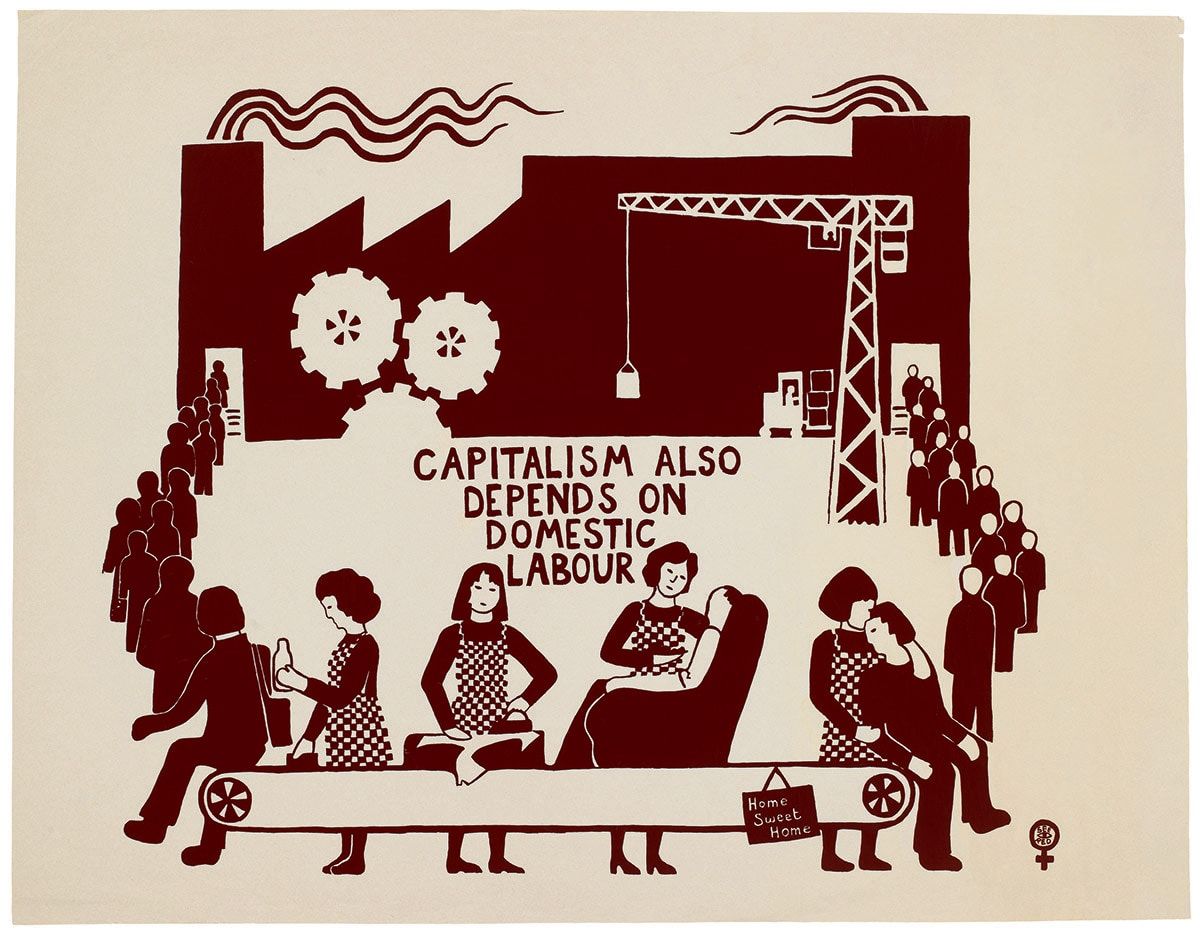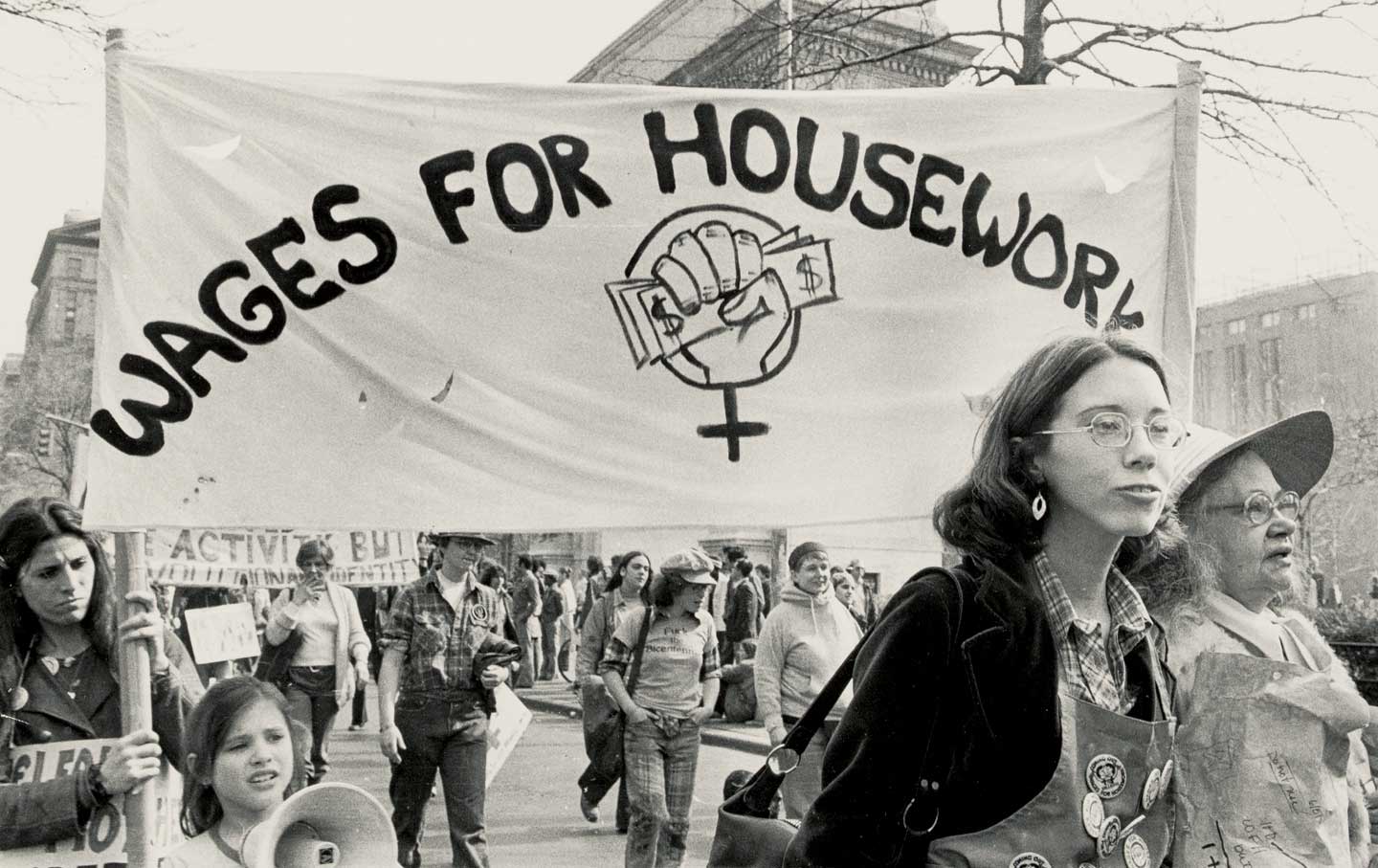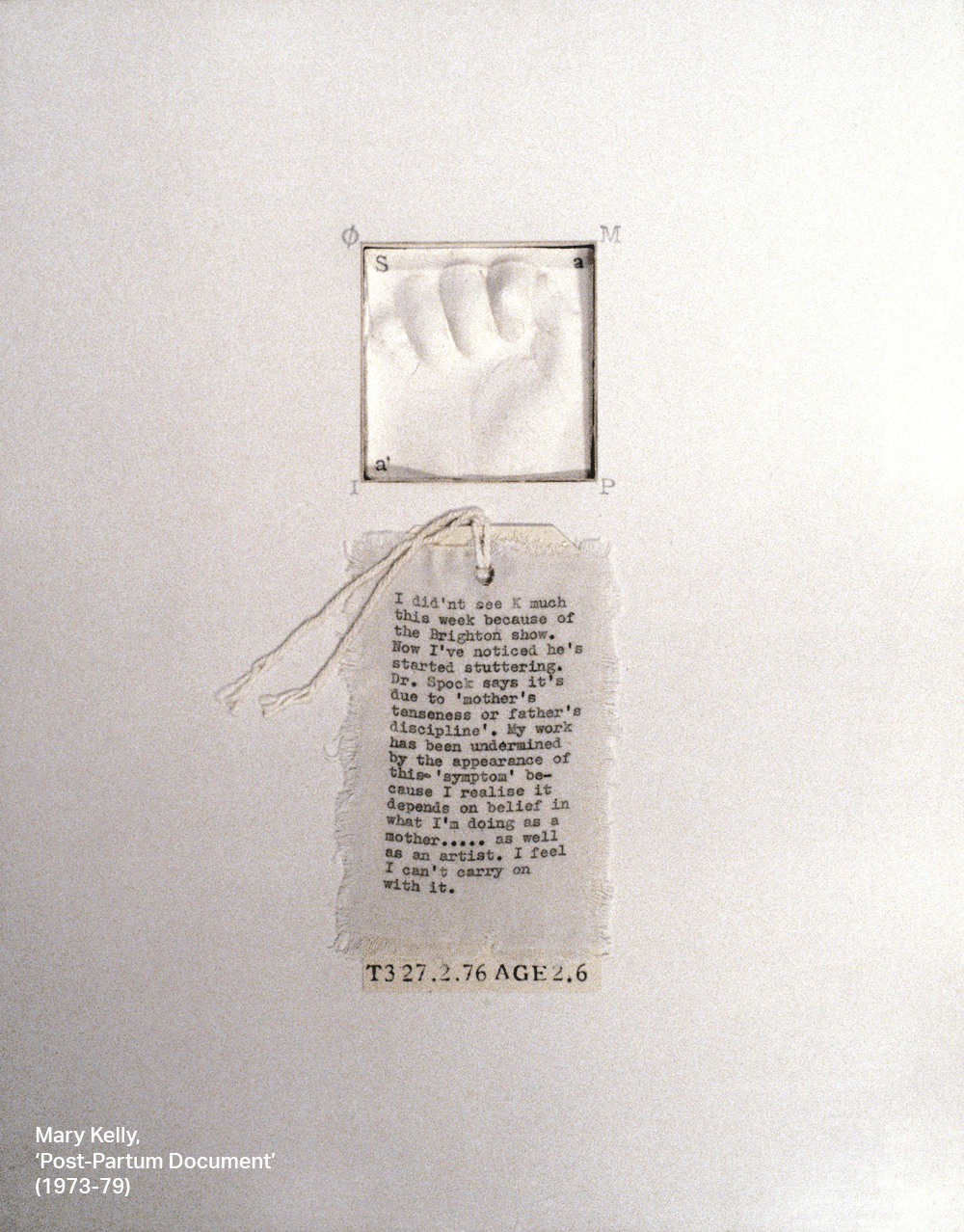
A Note on ‘Wages for Housework’: Federici against Davis
Daniel Geen
1st May 2023
Politics
1st May 2023
Politics
The cost-of-living crisis has seen the issue of childcare take centre stage in high-political discourse as its increasing costs are forcing parents - principally mothers - to forego career development and instead take on greater responsibility as primary care givers [1]. The present conjuncture is then one in which people cannot afford to work due to the exponential rise in childcare costs, entailing a retreat into domesticity that is disproportionately falling on the shoulders of women. It is in this context, wherein the responsibility of domestic labour is becoming increasingly pronounced over and against the burden of waged labour, that a return to the ‘Wages for Housework’ debates seems apt.
The ‘Wages for Housework’ (hereafter ‘WfH’) movement has a long and complex history within feminist political theory and action, and this ‘Note’ does not pretend to be anything like an exhaustive account of the rich and complex mechanisms that constituted it. Instead, I would like to probe the writings of two prominent thinkers within this movement (and the feminist movement more broadly) – Silvia Federici and Angela Davis – to trace the antagonisms that faced second-wave feminists when answering the question: What is to be done? I will do this by outlining Davis’s position in her essay ‘The Approaching Obsolescence of Housework: A Working-Class Perspective’ (1981), and Federici’s in her ‘Wages Against Housework’ (1975), to highlight how Davis attempts to completely undermine Federici’s argument by insisting upon its inherent whiteness, whilst downplaying WfH’s rhetoricity and taking the demands of the movement as purely literal [2]. Against this, I will highlight Federici’s insistence on WfH as a limit-demand that exposes the inability of capitalism to cover the costs of its own reproduction. After critically analysing the two arguments I will assert a reading of Davis’s work as ‘Menshevik’ and Federici’s as ‘Bolshevik’. I invoke these giants of the Russian Revolution not to make any substantial claim but only to draw an analogy between the debates that led to the bifurcation in 1917 and the splintering of the Wages for Housework movement. Landing on the side of Federici, I will argue that the ‘Cost of Living Crisis’ that plagues our contemporary moment provides an acute impetus to (re)consider her approach over and against that of Davis’s.
The ‘Wages for Housework’ (hereafter ‘WfH’) movement has a long and complex history within feminist political theory and action, and this ‘Note’ does not pretend to be anything like an exhaustive account of the rich and complex mechanisms that constituted it. Instead, I would like to probe the writings of two prominent thinkers within this movement (and the feminist movement more broadly) – Silvia Federici and Angela Davis – to trace the antagonisms that faced second-wave feminists when answering the question: What is to be done? I will do this by outlining Davis’s position in her essay ‘The Approaching Obsolescence of Housework: A Working-Class Perspective’ (1981), and Federici’s in her ‘Wages Against Housework’ (1975), to highlight how Davis attempts to completely undermine Federici’s argument by insisting upon its inherent whiteness, whilst downplaying WfH’s rhetoricity and taking the demands of the movement as purely literal [2]. Against this, I will highlight Federici’s insistence on WfH as a limit-demand that exposes the inability of capitalism to cover the costs of its own reproduction. After critically analysing the two arguments I will assert a reading of Davis’s work as ‘Menshevik’ and Federici’s as ‘Bolshevik’. I invoke these giants of the Russian Revolution not to make any substantial claim but only to draw an analogy between the debates that led to the bifurcation in 1917 and the splintering of the Wages for Housework movement. Landing on the side of Federici, I will argue that the ‘Cost of Living Crisis’ that plagues our contemporary moment provides an acute impetus to (re)consider her approach over and against that of Davis’s.

Since Davis’s article can be read as a (c)overt takedown of Federici’s argument I will begin by detailing the latter. Federici inserts herself dialectically in the ‘WfH’ debates by inverting the original ‘Wages for Housework’ to ‘Wages against Housework’. This reversal is not to suggest a departure from the WfH movement but instead speaks to the utopian trace Federici notes within its demands. Indeed, at the essay’s inception, she notes that Wages for Housework is not so much a ‘thing’ as it is a ‘political perspective’, not a tangible end but an orienting mechanism for struggle. By painting the movement as a perspective to be assumed and not a goal to be reached, Federici works to stress the oxymoronic character of the ‘waged housewife’ within the conditions of capitalism. The housewife will never have her labour waged… and if she did, it would no longer be under capitalism.
Federici’s ‘against’ (as opposed to ‘wages for housework’) is operative on two levels. In one instance, it helps to highlight the patriarchal character of capitalist society in that it is unwilling, indeed incapable of providing a wage for the housewife’s labour that secures its perpetuation; the wage-form, as essential to capitalism, is not extendable to the private realm, the vestige of the housewife. Hence ‘wages’, as constitutive of the capitalist system, are well and truly against housework. This latter point speaks nicely to the second operative function of her ‘against’: given the structural exclusion of housewives from the wage-form, any realisation of wages for housework would entail an emancipation from the economic dependency that maintains her position as both ‘wife’ and in the ‘house’. Moreover, given that unpaid labour is worth, at a 2020 estimate, around $10.9tn and disproportionately owed to women, the payment on such a debt and the upkeep in wage costs would signal the collapse of the capitalist system completely. Thus, for Federici, WfH is not some assimilationist dream of securing all women’s place within the wage-form, but a revolutionary demand calling out from and against women’s domestication under capitalism. The housewife, for Federici, is the proletariat’s forgotten sister who has her own fight: the negation of herself as housewife as the revolutionary means to undermine the system that interpellates her as such.
‘For Federici, Wages for Housework is not some assimilationist dream of securing all women’s place within the wage-form, but a revolutionary demand calling out from and against women’s domestication under capitalism.’
For Davis, however, the demands of WfH appear completely literal. Her prime contention is that paying service to the housewife’s as of yet unrecognised labour will do nothing but engender a personal, economic investment in their position in the home, that is, in the naturalisation of their oppression. Moreover, Davis highlights a perceived racial and class blindness in that the WfH presupposes that all housework is unwaged and as such fails to accommodate the waged labour of black and brown working-class women caring for the children of white women who have been ‘liberated’ from the home. On the whiteness of the WfH movement, Davis goes further to illustrate how the ‘vulnerable’ image of the housewife that informs white, bourgeois mythology – that, in turn, entails the housewife’s domestic confinement – is completely alien to black history. Pointing to the equality of black men and women in their labour during slavery, Davis argues that this gave rise to a domestic corollary wherein housework was equally shared within black family units. Furthermore, the conditions of slavery meant that black women had to be ‘strong’ in order for her, and her community to survive. Thus, the image of the housewife as weak and dependent, for Davis, is not only at odds with black history, but is completely outside of the structures of black intelligibility. Davis, therefore, commends WfH for making visible the unpaid labour of the housewife, but is sceptical of its political potentiality due to its perceived whiteness and assimilationist tendencies that will do little to revolutionise the position of women, particularly those classed and racialised.
Although both Davis and Federici agree that the housewife needs to struggle to deny her own interpellation as housewife, the methods by which this is to be achieved differ greatly between the two. As we have seen, for Federici, the classed and gendered position of the housewife provides the organising standpoint from which women can collectively struggle to destroy the housewife as a naturalised condition for women. This, in turn, for Federici, will necessarily give way to the end of a social system dominated by capital and unwaged labour. Davis, on the other hand, takes the more Marxian line and insists that women must first liberate themselves from domesticity and join their ‘brothers’ in waged labour. That is, they must begin the process of proletarianization if they are to realise any revolutionary change. Given Davis’s example of the gender equality in slave-labour as engendering a familial corollary, one can note the reapplication of this logic in Davis’s advocation of the housewife’s proletarianization – entry into the workforce providing the conditions in which gender equality can be attained both inside and outside of the home.

It is at this point where I feel compelled to delineate between the two along the lines of Menshevik and Bolshevik, with Davis occupying the former and Federici the latter. I make this comparison to emphasise the confrontation taking place within WfH discourses. The splitting of the Russian revolutionary party into the Mensheviks and Bolsheviks was occasioned by a disagreement over the path the revolution was to take.[3]. On the one hand, the Mensheviks, maintaining a purely stagist conception of history, insisted upon the need for the bourgeois revolution to first take place after the abdication of Tsar Nicholas II and with it the end to the Tsarist regime. The Menshevik’s intransigence on this point oriented around the fact of the limited industrialisation that had taken place in Russia, which entailed the existence of a small population that could be correctly named ‘the proletariat’ – employed by the bourgeoisie who owned the means of production in which workers sold their labour for wages. Without first allowing for a bourgeois revolution and the consolidation of a capitalist society, the birth of a revolutionary class – the proletariat – would be all too premature. On the other hand, the Bolsheviks departed from a pure stagist teleology and were adamant that the small class of proletariats, alongside the lumpen-proletariat and the peasantry could be sufficiently mobilised to pursue a path towards communism. As such, against the Mensheviks and their advocation of a process of total proletarianization, the Bolsheviks, with Lenin at the vanguard, sought to leap-frog the bourgeois revolution and bypass the generations of immiseration that this would entail.
The fissure of the revolutionary movement in Russia was thus instigated by opposing responses to the question ‘What is to be done?’, with the Mensheviks advocating for bourgeois revolution and the proletarianization of the masses, whilst the Bolsheviks sought to instrumentalise the collapse of the Tsarist social order to immediately activate a communist revolution. As such, an analogy can be drawn that I believe helpfully illustrates the distinctions between Davis’s and Federici’s positions – Davis, the Menshevik, advocates the housewife’s proletarianization and Federici, the Bolshevik, denies not only the necessity, but more so the myopia of proletarianization conceived as a process purely restricted to the production line.
Already from Lenin one can note a splintering of what constitutes a revolutionary class in his willingness to embrace those that fall outside of a class position determined by their exploitation via the wage-form – largely, the peasantry. This diversification of the revolutionary class is evident, in a feminist register, with Federici’s insistence on the housewife as occupying a site of revolutionary potentiality by virtue of what she is. Hence, Federici, like Lenin, is willing to embrace the revolutionary potentials of those existing outside of the capitalist wage relation, whilst Davis, like the Mensheviks, affirms the privileged position of the proletariat within revolutionary struggle by virtue of their exploited position within the capitalist wage relation. Finally, as Raymond Guess notes, the Bolshevik emphasis on ‘kairos’, that is, the amenability of one’s (historical) conditions to the achievement of one’s goal, further decentres the proletariat as the sine qua non of revolutionary action and re-emphasises contingent/historical conditions [4]. This begs the question of Federici, if the fall of the Tsarist regime facilitated a revolutionary impetus without the consolidation of capital and the availability of a proletarianized mass, what historical conditions are available for the housewife to assume her revolutionary role?
The stability of the housewife as a social category has been, to some extent, positively undermined by the decades of capitalism’s neutering and consolidation of the social movements of the 1960s that has entailed more women being liberated from the home and secured their entrance into the workforce. Following Nancy Fraser, it can be said that the housewife’s emancipation has followed a telos from expropriation to exploitation [5]. Indeed, much of what Angela Davis hoped for the housewife has been realised in so far as they have - again, to some extent - managed to sever their chains to the kitchen sink and enter into waged labour. Yet, the contemporary cost-of-living crisis facing the West has brought into sharp relief the spectral nature of the housewife that continues to haunt women’s structural position. As The Guardian article referenced above noted, two-thirds of women in the UK are witnessing a regression of their career prospects due to the now unaffordable demands of childcare, entailing the disproportionate designation of women as primary caregivers and, concomitantly, the sacrificing of any career progression [6]. The entry into waged labour – for Davis, entrance into the process of proletarianization - has not done away with the patriarchal assumption that women bear the responsibility for care and social reproduction. As such, one can note the two-directional character of the housewife’s historical trajectory: growing emancipation from domesticity does not guarantee the realisation of emancipation, there remains the threat of regression.

This issue of regression points to the inadequacy of Davis’s theoretical position insofar as it neglects the gendered specificity of women’s struggle; it is not enough to expect entrance into waged labour to fully disentangle women from the ideological baggage of patriarchy within capitalism, their struggle must be fought on (at least) two frontiers. Moreover, the proletarianization of the housewife has done little to decrease the ‘double burden’ waged-mothers face, rather, the increased entry of women into waged labour has heightened (or, at least, redefined the parameters of) this double-burden. In this context, it is of little shock that there is a broadening appeal of women choosing the life of a ‘trad wife’ – wherein women ‘elect’ to assume the role of the housewife and position themselves within the structures of an ‘ultra-traditional’ marriage. Hence, we can see the reactionary tendencies that emerge from the immiseration of housewives-cum-proletariat where relief from the double-burden can be found in one’s embracement of their domestication.
The contemporary resurrection of the housewife is occurring on two fronts: the reactionary return to the ‘trad wife’ lifestyle in the hope of amputating half of the double-burden of work and care, and those who, by necessity, find themselves unable to afford the costs of childcare to continue their employment and thus are pushed back into the home. The pertinence of this latter position is reflected in last Conservative government’s budget in which (inadequate) childcare provisions were a central component. Such provisions sought to stem a huge loss in labour supply by expanding the amount of free childcare available to families. Yet, as many critics have pointed out, the last decade of austerity has resulted in a gutting out of childcare facilities and, therefore, a simple expansion of the amount of free childcare available to families will do nothing but exacerbate a sector that is already struggling to meet demand.[5] As a result, even those that would benefit from the extra free childcare – in that they would remain ‘free’ to work – will come up against the lacking availability of nursery spaces. Thus, those who cannot afford private childcare will have no choice but to reduce their hours at work and, as evidenced in the recent Guardian article cited above, this will disproportionately fall on the shoulders of women. The structural contradiction is clear, people (largely women) cannot afford to work, due to the increased costs of childcare occasioned by the cost-of-living crisis.
To conclude then, the resurrection of the housewife in our contemporary moment arguably points to the inadequacies of Davis’s recommendation that women join their ‘brothers’ in waged labour as a means of dispelling their interpellation as housewives. This follows as the last 60-years has seen a huge increase in women entering the labour force and yet, at a time of acute crisis, the responsibility of childcare is once again falling on the shoulders of women. It is for this reason that Federici’s position is of much greater interest. The resurrection of the housewife requires a novel political outlook that can be operative for and by the housewife without any need of (re)entering traditional forms of waged labour. By calling for economic recognition for the work housewives perform in providing the conditions of possibility for capitalist (re)production – namely, child-rearing – and organising around this issue as the locus of struggle, the housewife may yet undo a system that does not value ‘feminised’ forms of labour and also draw attention to the inherent contradictions of contemporary capital that is forcing women back into the home, namely that mothers cannot afford to work.
1. R. Partington, ‘Two-thirds of UK women say childcare duties affected career progression,’ The Guardian (8th March 2023)
2. S. Federici, ‘Wages Against Housework,’ (1975), pp.15-23, in Revolution at Point Zero: Housework, Reproduction, and the Feminist Struggle (OPM Press, 2012); A. Davis, ‘The Approaching Obsolescence of Housework: A Working-Class Perspective,’ from Women, Race and Class (1981 [2012])
3.See C. Miéville, October (Verso, 2018).
4. R. Geuss, Philosophy and Real Politics (Princeton University Press, 2008), 31.
5. N. Fraser, ‘Expropriation and Exploitation in Racialised Capitalism: A Reply to Michael Dawson,’ Critical Historical Studies, vol. 3, no.1 (Spring 2016): 163-178.
6. R. Partington, ‘Two-thirds of UK women say childcare duties affected career progression,’ The Guardian (8th March 2023).
7. S. Marsh, ‘’This won’t stop nurseries going bust’ – mothers and staff react to extra childcare support,’ The Guardian (15th March 2023).
